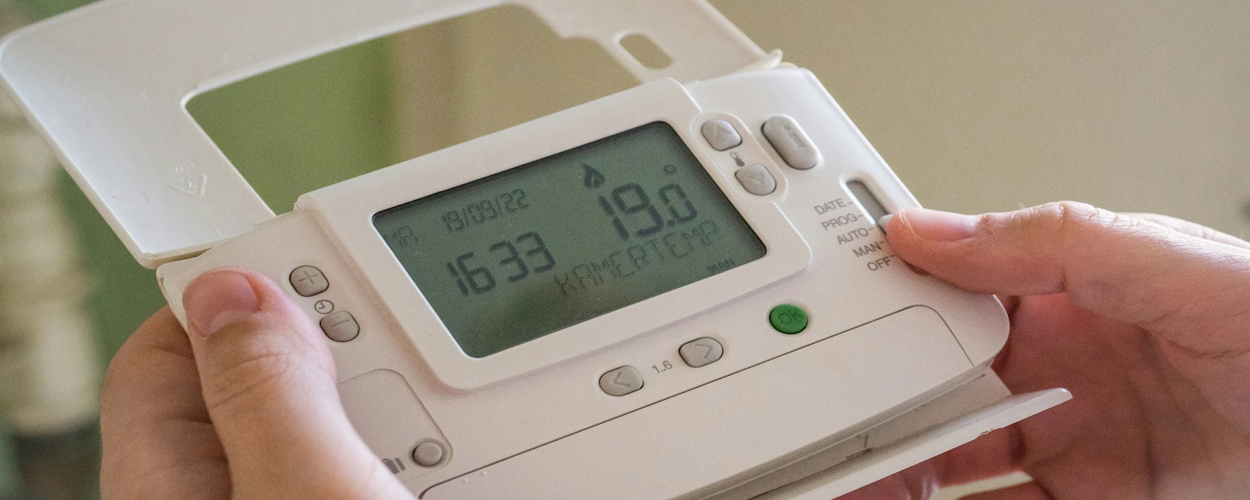The recent spikes in energy costs have thrown into sharp focus the challenge of heating our homes. Domestic heating is important, not just for our comfort and wellbeing, but to reduce humidity and prevent condensation. But because traditional heating systems rely on fossil fuels, such as natural gas and oil, heating is a significant contributor to carbon emissions. In 2019, 17% of heating emissions from buildings came from housing. This has to change if the UK and other countries are to meet their targets in achieving net zero emissions by the middle of the century.
A recent online event, hosted by Unlock Net Zero, took stock of how the heating industry is making the transition to low carbon heating systems, notably through the installation of heat networks and heat pumps.
The webinar also highlighted work by housing associations to decarbonise domestic heating systems, and considered the role of government policy and funding in persuading more people that decarbonisation of domestic heating is good for them and for the planet.
Decarbonising social housing: gathering data and preparing for change
Among the speakers at the event was Kara Tomes-Meek, head of sustainability at Southern Housing, a social housing association formed in 2022 after a merger between Optivo and Southern Housing Group. The association has over 80,000 homes across the Midlands, London, Kent, Sussex and the Isle of Wight.
Kara described Southern Housing’s decarbonisation journey, which has heat networks at its heart. These networks generate heat centrally, which is then transported through a network of pipes to provide space heating, hot water, and sometimes cooling to connected buildings. By supplying multiple buildings, they avoid the need for individual boilers or electric heaters in every building. And by utilizing renewable and low-carbon heat sources, heat networks help reduce greenhouse gas emissions associated with heating.
Southern Housing has conducted a number of heat network surveys, covering 65% of its homes, to assess current assets and to consider the potential for low carbon heating. Pulling the data together from these surveys, Southern has identified quick wins for efficiencies (such as improving insulation) and challenges, such as identifying small spaces that are not feasible for the size of decarbonisation equipment required. Once all the data has been collated, Southern can complete the process of mapping out its decarbonisation strategy.
Kara also outlined how Southern Housing is preparing for upcoming regulatory changes that will impact the social housing and heating sectors. Under the 2023 Energy Security Act, a new Heat Network Market Framework has been established with the aim of giving consumers greater protection and making the construction and maintenance of heat networks easier. In 2025, Ofgem’s remit as energy regulator will be expanded to cover heat networks. As part of its preparations for these changes, Southern Housing has been working with a consultant on a gap analysis to assure a well-defined route to compliance.
Kara went on to explain how Southern has been making good use of government funding schemes – such as the Heat Network Efficiency Scheme (HNES), Heat Network Optimisation Opportunities and the Green Heat Network Fund – to decarbonise its housing stock.
One project in Dagenham was part-funded by the Heat Network Efficiency Scheme (HNES), with match funding from Southern. The project involved the installation of a heat network serving 82 residents, and resulted in increased heating efficiency of 50%, and annual carbon reductions of 55%.
Heat pumps: growing interest, but a long way to go
Charlotte Lee, chief executive of the Heat Pump Association (the trade association for the heat pump sector), highlighted the important role of heat pumps in decarbonisation. She outlined the various options, noting that air-to-water source heat pumps remains the most popular and cost-effective option. This type of heat pump transfers heat from the outside air to water, which in turn efficiently heats buildings via radiators or underfloor heating.
Consumer interest in heat pumps has been rising. Around 60,000 heat pumps were sold in the UK in 2022, nearly doubling sales from the previous year. However, this is still much lower than other European countries – France, for example, sold over 600,000 heat pumps in 2022 – a figure that the UK government hopes to achieve by 2028.
Costs for heat pump installations are higher than gas boilers, but Charlotte underlined the importance of government funding schemes in persuading consumers that replacing their old gas boiler with a new one is no longer a sensible option.
Among the schemes highlighted by Charlotte:
Boiler Upgrade Scheme offering a grant to cover part of the cost of replacing fossil fuel heating systems with a heat pump or biomass boiler. Launched in May 2023, the grant was increased in October from £5,000 to £7,500 per installation, prompting a big jump in installations.
Energy Company Obligation aims to assist householders living in fuel poverty. The latest version of the scheme supports the rollout of heat pumps, making it more appealing for energy companies to leverage carbon savings.
Heat Network Efficiency Scheme supports performance improvements to existing district heating or communal heating projects.
Public Sector Decarbonisation Scheme supports the aim of reducing emissions from public sector buildings by 75% by 2037.
Skills: qualified workers needed for future challenges
Charlotte also highlighted the importance of ensuring that enough qualified heating engineers are available to meet the growing demand for low carbon heating installations. She reported an encouraging 166% increase in the number of engineers taking heat pump qualifications in 2022-23. In addition, a new Low Carbon Heating Technician Apprenticeship, launched in 2023, is expected to generate further interest.
The need for a new generation of qualified workers is clear. Currently there are about 3,000 qualified heat pump installers in the UK. But the country will require 27,000 qualified installers by the end of the decade if it is to meet the government’s target of installing 600,000 heat pumps a year.
Final thoughts
Decarbonising Britain’s housing stock is a monumental challenge. Some 29 million homes need to be upgraded to low carbon heating systems by 2050. Heat networks and heat pumps will have a vital role to play, but as the webinar underlined, different factors, including regional geography, house type and existing heating systems mean there is no one-size-fits-all approach.
The heating sector and the further education sector will play their part in preparing for these challenges, but there is a need for greater clarity about the future of decarbonisation. This was underlined in a 2022 report from the House of Commons Business, Energy and Industrial Strategy Committee:
“The Government should work with industry, consumers, and affected workers to
produce an effective road map detailing how the transition to low carbon heating will
take place, and to include what this will mean for different households in different parts
of the country and for workers whose jobs might be affected in existing carbon intensive
parts of the heating sector.”
Heating choices are often driven by policy, and once governments start making it clear that decarbonisation of housing is an imperative – and providing the necessary funding for installations and training – consumers can start making informed decisions about replacing their existing heating systems with low-carbon alternatives.
Photo by Arthur Lambillotte on Unsplash

